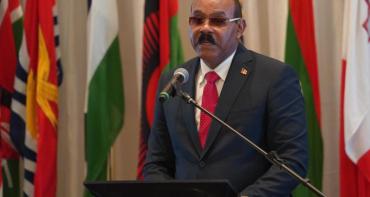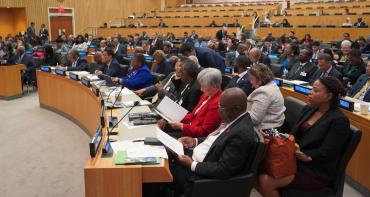August 1979: Accord on racism sets out Commonwealth duty to tackle discrimination and apartheid.

A landmark accord establishing the Commonwealth at the forefront of the struggle against all forms of racism was reached in August 1979.
The Lusaka Declaration, reached at a summit of Commonwealth leaders in the Zambian capital, set the association out as a body of states specifically “committed to the eradication of the dangerous evils of racism and racial prejudice”.
Issued against a backdrop of political turmoil in Zimbabwe, the declaration was hailed as a breakthrough which helped contribute to the end of white minority rule in that country.
“Inspired by the principles of freedom and equality which characterise our association, we accept the solemn duty of working together to eliminate racism and racial prejudice,” the 39 gathered world leaders stated on 7 August.
“We reject as inhuman and intolerable all policies designed to perpetuate apartheid, racial segregation or other policies based on theories that racial groups are or may be inherently superior or inferior,” they continued.
Building on Singapore principles
Lusaka expanded upon principles first outlined in the Singapore Declaration of 1971, which set out how member states of the Commonwealth must embrace equal rights for all regardless of race, colour, creed or political belief.
Crucially, it explained in greater detail the obligations that member countries face in eliminating discrimination in their own societies, including in the right to vote, in civil rights and access to citizenship, and in education, health, employment, finance, housing and social security.
The agreement attached special importance to “ensuring that children shall be protected from practices which may foster racism or racial prejudice” and established the principle that special measures may be necessary to help disadvantaged and indigenous groups.
The summit in Lusaka marked the first time leaders had met for a full Commonwealth Heads of Government Meeting (CHOGM) in Africa.
Response to the Zimbabwe crisis
The accord was prompted partly by political turmoil in Zimbabwe, then known as Zimbabwe-Rhodesia under a fragile peace deal between white minority prime minister Ian Smith and black African leaders following years of effective apartheid.
At that time, Zimbabwe’s police, civil service and security forces were controlled by the white minority and Commonwealth leaders felt they needed to clarify their position following the perceived failure of previous international attempts to broker peace.
Then Secretary-General of the Commonwealth, Shridath Ramphal, in his opening speech in Lusaka reminded gathered leaders that by sticking to principles they would not “fail to move closer to the goal of Zimbabwe’s true independence”.
He said: “It must be history’s mandate and a more personal challenge that as a result of our work in Lusaka no shadow shall hereafter fall between the conception and the reality of Zimbabwe’s freedom.”
Apartheid an “affront to humanity”
Following the Lusaka Declaration, which declared the “infamous policy” of apartheid as an “affront to humanity”, Zimbabwe’s leaders convened a conference at Lancaster House in the UK which paved the way for the end of white rule and full independence.
Newspapers at the time reported how the Lusaka accord marked a “breakthrough” in the Zimbabwe dispute.
“The Commonwealth succeeds where the United Nations failed,” reported one American newspaper, the Toledo Blade, on 12 August 1979. “The Lusaka summit marks a turning point in the fortunes of whites and blacks in Africa.”



